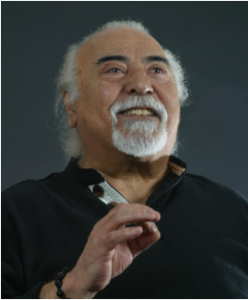 Esfandiar Monfaredzadeh, musician and composer
Esfandiar Monfaredzadeh, musician and composer
Esfandiar Monfardzadeh was born in 1941 in Tehran, Iran. From an early age, he learned playing various instruments, and from the age of thirteen, he played the tambourine, accordion, and dulcimer in school art programs. At fifteen he played with a group in the Children’s morning program of Iran’s national radio. From the age of sixteen, he worked and played instruments in cafes and theaters in Tehran.
Monfardzadeh was nineteen years old when he started composing songs and composed a song for the Radio Iran Youth Orchestra. He went on to compose more than ten songs in the next three years. Along with writing songs, one of Monfardzadeh’s major interests was writing soundtracks, and he regularly checked with Iran’s film studios at the time to pursue any possible opportunity.
In 1967, he started a degree in music at the Faculty of Fine Arts in the field of music, but after about two and a half years, he dropped out of the university program.
It was at the opening ceremony of the same college that he arranged and conducted the music of the “Great Student Orchestra of the University of Tehran” (sixty musicians and fifty choirs) for the opera “Conquest of Babylon” (composed by Reza Narvand). This opera was held in the presence of the King and Queen of Iran.
It was from 1969 onwards that he was commissioned by various studios to write and record soundtracks, arrange lip-syncing songs, compose melodies and perform various songs. It was at that time that composing and arranging the full soundtrack for a movie called “Ghaisar” made him famous.
In 1971, he received the award for best soundtrack for it, and a year later, he received the award for best soundtrack again for composing and arranging the soundtrack of another film called “Reza Motori”. In that film, for the first time, he used “song” for the soundtrack.
While in Iran, he composed more than hundred songs, most of which were among the most popular songs of the time. He also composed soundtracks for tens of films. His reputation as soundtrack composer greatly helped the popularity and sales of films.
Monfaredzadeh left Iran for the United States in one year after the Islamic Revolution, to protest the persecution of dissidents. He has not returned to Iran since then and during this time he has composed about 20 songs and soundtracks.















